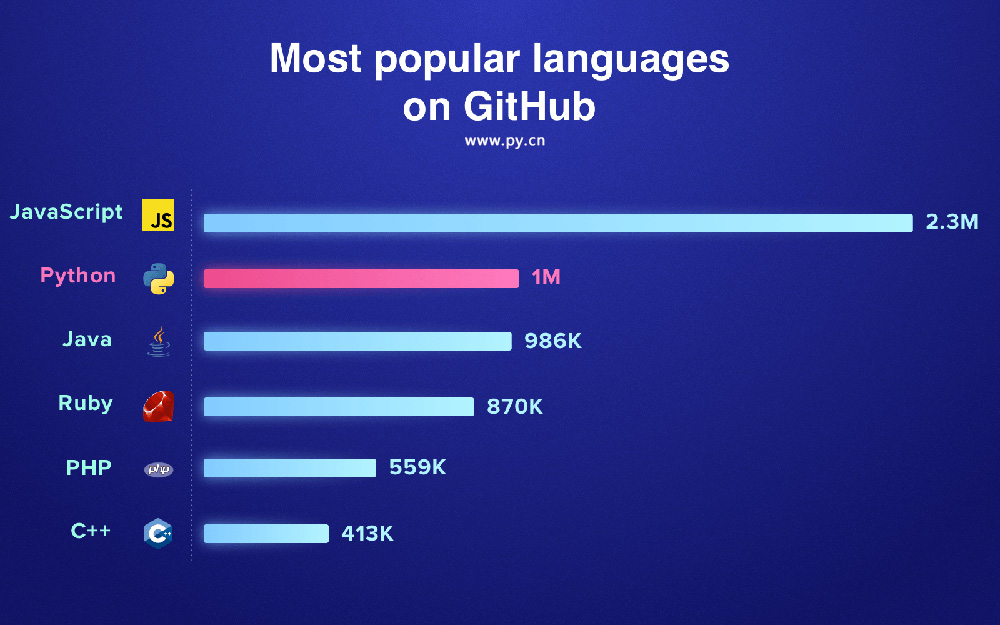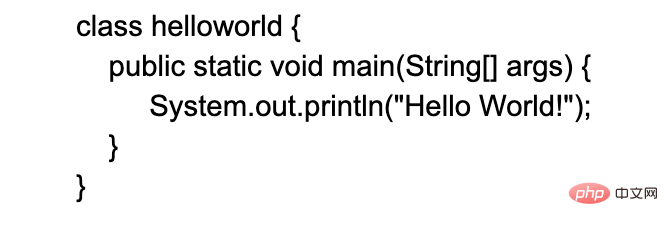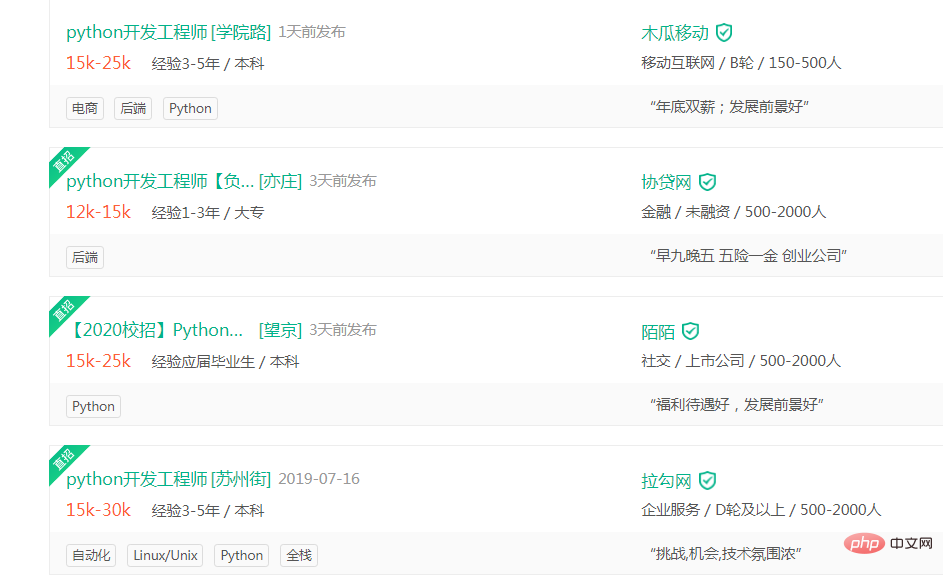Home >Backend Development >Python Tutorial >What is Python? 13 reasons why you should learn and use it
If you're looking to move into website development or software development and become a programmer, you can't go wrong learning the basic trio of HTML, CSS, and JavaScript. But to really stand out in a crowded application field, you still need to learn other programming languages.

(The picture above shows the ranking of GITHUB’s most popular programming languages)
There are many programming languages to choose from, but as a beginner, which one should you choose? Where is one? Which programming languages are worth learning? Now let’s figure out which programming language will give you the highest return on investment. Knowledge is power!
As a python learning website (www.py.cn), of course we recommend you to learn python! You can't just sell your melons and boast about yourself. Today, python learning website will take you to discuss in depth 13 reasons why you should consider learning to use python.
Contents
What is Python?
The biggest advantages of Python
13 reasons why you should learn and use Python
1. What is Python? - Basic Definition
Python is a general-purpose coding language - meaning, unlike HTML, CSS, and JavaScript, it can be used for other types of programming and software development besides web development.
Python can be used for the following:
Back-end (or server-side) Web and mobile application development Desktop application and software development Processing big data and performing mathematical calculations Writing system scripts (creating instructions, Telling a computer system to "do" something)
But don't let Python's broad scope scare you. Like those more familiar sounding languages, Python is an easy-to-learn, on-demand programming language that can exponentially increase your rentability and revenue in just a few months.
2. The biggest advantage of Python
Python is a rising star in the field of programming, mainly for two reasons: it can handle a large number of tasks, plus it actually It is a very beginner-friendly language. Python's syntax uses English keywords, which makes it easy for anyone to understand and start using the language.
For example, look at your code that prints the text "Hello World" on the screen using the programming language Java:

For such a simple function , which is a lot of code.
Now look at the same exercise written in Python:

Whichever one you prefer, right? Still, as simple as Python's syntax is, it's used in projects as complex as artificial intelligence and machine learning. This means that Python is ideal for a wide range of users, including:
Beginner programmers, mobile app developers, software engineers, data scientists, and anyone else learning computer programming!
Related tutorial recommendations: Python introductory video tutorial
3. 13 reasons why you should learn and use Python
1. There are many Python jobs
At the time of writing this article, Lagou.com listed 500 Python-related job openings in Beijing alone. Because Python can be used in many ways, including software engineer positions, machine learning, artificial intelligence engineers and other advanced jobs.
And Python means a pretty good salary, with a basic monthly salary of around 20K.

#2. Startups love Python
Startups need to be lean to survive, which means when they build their numbers When building a product (whether it's a website, mobile app, or software program), these products need to be completed ahead of time and within budget. Since it helps achieve these two goals, Python is a popular programming language in the startup world.
Python's efficiency and ease of use means less development time, streamlined QA and debugging processes, and an overall higher return on investment, not more difficult to navigate coding alternatives. Startups are a great place to get your first job and start gaining industry experience, and knowing your way around Python will make you more attractive.
3. Python doesn’t take long to learn
For a language as powerful and versatile as Python, you might think it would take years to learn how to use it . It's not like this! Industry professionals say that the basics of Python (Python's syntax, keywords and data types, etc.) can be learned in as little as 6 to 8 weeks if you have previous experience with the coding language.
4. You can learn Python basics for free
In "It's too good to be true (but it is!)", Python official website provides a free Python beginner's guide on its website. This free resource offers a wealth of tutorials for Python beginners, including material tailored for beginners with no programming experience, as well as material for beginners with some programming experience.
At the same time, if you are looking for more free beginner resources, then the more well-known domestic ones like python learning network are also free to learn, with video tutorials , manual tutorials, technical articles, Q&A community, etc.!
5. Python has a community of supportive users
Python is an open source coding language, meaning it is free to use and anyone can modify or create the language extension. Open source is what allows a language to have libraries, frameworks, and other tools that keep the language relevant and adaptable. However, open source can only reach its potential if there is a supportive community of users using the language.
The Python official website has a dedicated community page with links to many community groups and forums where you can find advice, guidance, inspiration from Python enthusiasts, or just chat about the greatness of Python, of course If your English is very poor, you can go to the forum community of Python Learning Network to communicate and learn!
6. Python is the most popular language growing
Does it really matter if a programming language is popular? Yes, sort of. If the best coding language in the world has no users, it's a bit like the proverbial tree falling in the forest - it doesn't matter, because no one uses it. The last thing you want to do is invest money and time into learning a language that isn't widely used to get the job done.
Besides The Economist, what we are seeing is that - as of last year - Python is becoming the most popular coding language in the world. With languages like Fortran and Lisp declining sharply, languages like C and C remaining steady but flat, and languages like Python and JavaScript rising sharply.
7. Python is versatile (versatility as a developer is a good thing)
Being general purpose means Python can do a lot of things.. ....This is why heavy tech players like Google, Facebook, and Instagram all use Python to build part of their tech stack. But Python can also be used to build basic programs like virtual magic 8-balls and dice rollers (and all points projects in between).
Python's versatility means that, as a developer, you will have a very wide range of options for working with it. Whether you want to work for a tech giant, build your own small software program, or work as a full-stack web developer, Python is a skill that makes these options possible.
8. Python means the front-end and back-end of a project will work better together
You can make your entire career as a front-end web developer, but technology is not just Just the front end. There's also the backend (the server side or "behind the scenes" part of websites and mobile apps) which consists of databases and web servers that power websites and apps.
When Python development teams talk about using Python as a “glue language” for websites and mobile apps, they talk about using it to script back-end operations, allowing for front-end and back-end coordination of digital products. Work. If you're looking to add server-side or back-end skills to your front-end repertoire (and get closer to a turnkey full-stack developer skillset), learning Python is a perfect way to get started.
9. You can use Python "out of the box"
Programming in some languages can become tedious. But not a game!
Python comes with a powerful standard library out of the box (no frameworks or other add-ons), making the coding process more efficient. Python’s standard library also provides developers with prepackaged “modules” (files composed of Python code) that allow developers to skip writing these functions, saving time and making their code more unified.
Then Python was created with a special emphasis on code readability, so the language focuses on English keywords rather than symbols and punctuation. This means that as a developer it is easier to scan code, maintain and update software, websites and mobile applications.
10. There are tons of ready-made libraries and framework resources
If you need something more customizable than the ready-made Python setup, no problem! Similar to languages like JavaScript, Python has no shortage of libraries and frameworks suited to your specific coding needs.
Popular Python frameworks like Django are designed to make Python more efficient for creating web applications, while PyQt is a framework that allows Python to build graphical user interfaces (GUIs) - user interfaces that involve using on-screen icons and graphics to handle user commands.
11. Python automates all the boring stuff
One of the hardest parts of working in technology (regardless of your role) is managing all of the repetitive, time-consuming, technology-related tasks. Little things like copying files, dragging folders and renaming them, uploading resources to the server - all this adds up to a lot of time in the long run.
Automation is another area of learning Python. Python's ability to script your system means you can create simple Python programs to automate mindless tasks that impact your productivity. Saving time by learning how to automate processes with Python is a huge selling point for learning the language.
12. Python career development prospects are bright
In fact, Python is the top language in the emerging field of data science, including the recently very popular:
Data Analysis
Artificial Intelligence
Machine Learning
These will lead the development of the future world. As a member of the world, are you ready? Then study quickly!
Original text from python learning network: https://www.py.cn/toutiao/11433.html
The above is the detailed content of What is Python? 13 reasons why you should learn and use it. For more information, please follow other related articles on the PHP Chinese website!